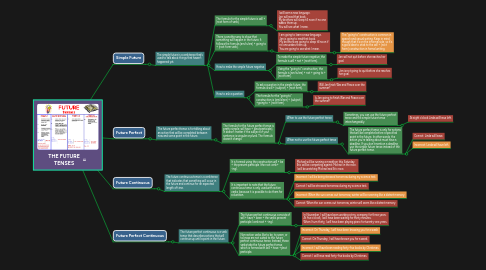
1. Simple Future
1.1. The simple future is a verb tense that’s used to talk about things that haven’t happened yet.
1.1.1. The formula for the simple future is will + [root form of verb].
1.1.1.1. I will learn a new language. Jen will read that book. My brothers will sleep till noon if no one wakes them up. You will see what I mean.
1.1.2. There is another way to show that something will happen in the future. It follows the formula [am/is/are] + going to + [root form verb].
1.1.2.1. I am going to learn a new language. Jen is going to read that book. My brothers are going to sleep till noon if no one wakes them up. You are going to see what I mean.
1.1.2.1.1. The “going to” construction is common in speech and casual writing. Keep in mind though that it’s on the informal side, so it’s a good idea to stick to the will + [root form] construction in formal writing.
1.1.3. How to make the simple future negative
1.1.3.1. To make the simple future negative, the formula is will + not + [root form].
1.1.3.1.1. Jen will not quit before she reaches her goal.
1.1.3.2. Using the “going to” construction, the formula is [am/is/are] + not + going to + [root form].
1.1.3.2.1. Jen is not going to quit before she reaches her goal.
1.1.4. How to ask a question
1.1.4.1. To ask a question in the simple future, the formula is will + [subject] + [root form].
1.1.4.1.1. Will Jen finish War and Peace over the summer?
1.1.4.2. The formula for the “going to” construction is [am/is/are] + [subject] +going to + [root form].
1.1.4.2.1. Is Jen going to finish War and Peace over the summer?
2. Future Perfect
2.1. The future perfect tense is for talking about an action that will be completed between now and some point in the future.
2.1.1. The formula for the future perfect tense is pretty simple: will have + [past participle]. It doesn’t matter if the subject of your sentence is singular or plural. The formula doesn’t change.
2.1.1.1. When to use the future perfect tense
2.1.1.1.1. Sometimes, you can use the future perfect tense and the simple future tense interchangeably.
2.1.1.2. When not to use the future perfect tense
2.1.1.2.1. The future perfect tense is only for actions that will be complete before a specified point in the future. In other words, the action you’re talking about must have a deadline. If you don’t mention a deadline, use the simple future tense instead of the future perfect tense.
3. Future Continuous
3.1. The future continuous tense is a verb tense that indicates that something will occur in the future and continue for an expected length of time.
3.1.1. It is formed using the construction will + be + the present participle (the root verb + -ing).
3.1.1.1. Michael will be running a marathon this Saturday. Eric will be competing against Michael in the race. I will be watching Michael and Eric race.
3.1.2. It is important to note that the future continuous tense is only used with action verbs, because it is possible to do them for a duration.
3.1.2.1. Incorrect: I will be being stressed tomorrow during my science test.
3.1.2.2. Correct: I will be stressed tomorrow during my science test.
3.1.2.3. Incorrect: When the sun comes out tomorrow, winter will be seeming like a distant memory.
3.1.2.4. Correct: When the sun comes out tomorrow, winter will seem like a distant memory.
4. Future Perfect Continuous
4.1. The future perfect continuous is a verb tense that describes actions that will continue up until a point in the future.
4.1.1. The future perfect continuous consists of will + have + been + the verb’s present participle (verb root + -ing).
4.1.1.1. In November, I will have been working at my company for three years. At five o’clock, I will have been waiting for thirty minutes. When I turn thirty, I will have been playing piano for twenty-one years.
4.1.2. Non-action verbs like to be, to seem, or to know are not suited to the future perfect continuous tense. Instead, these verbs take the future perfect tense, which is formed with will + have + past participle.
4.1.2.1. Incorrect: On Thursday, I will have been knowing you for a week.
4.1.2.2. Correct: On Thursday, I will have known you for a week.
4.1.2.3. Incorrect: I will have been reading forty-five books by Christmas.
4.1.2.4. Correct: I will have read forty-five books by Christmas.

